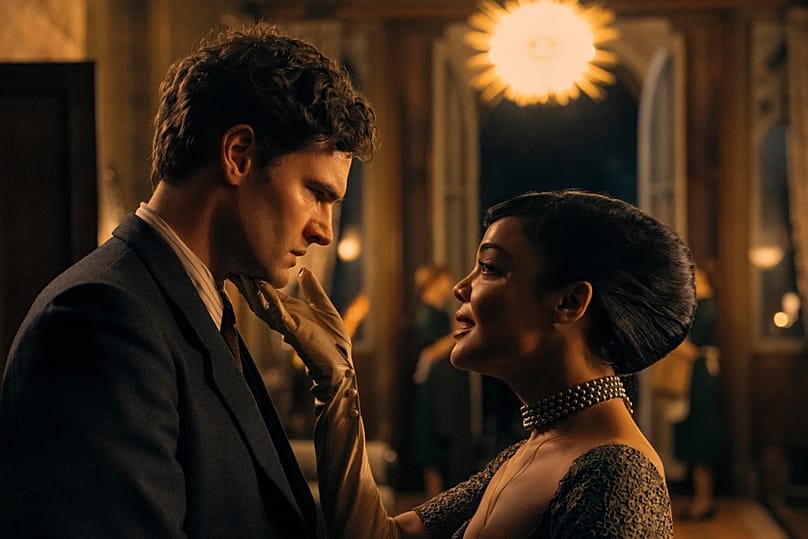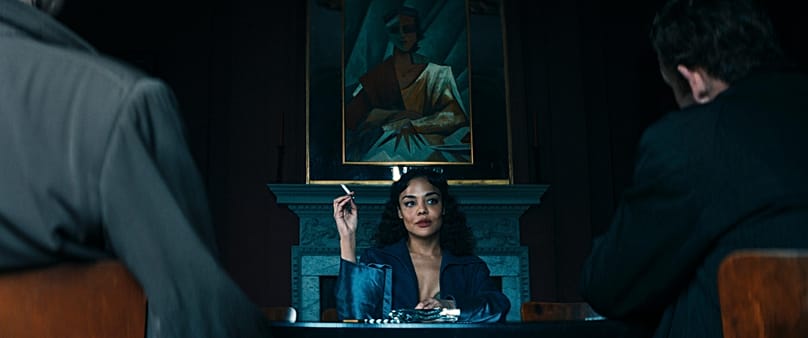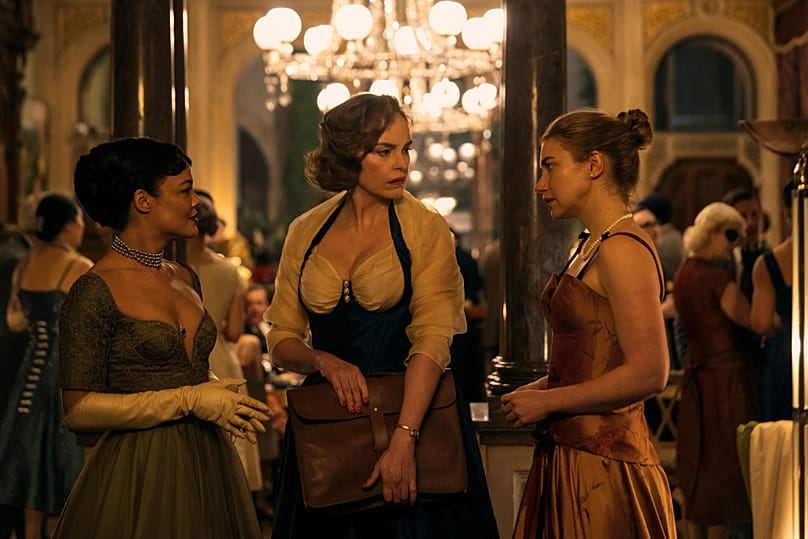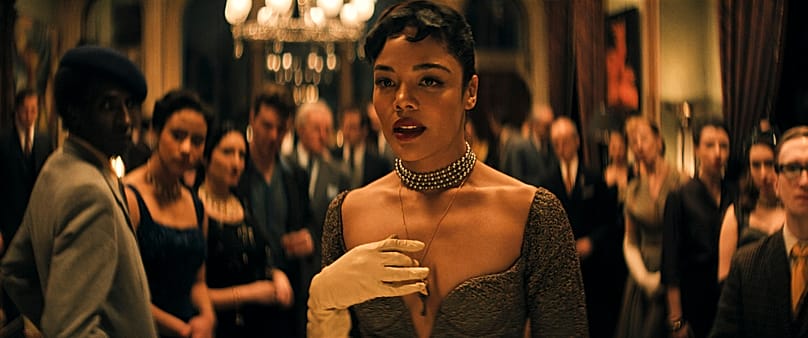Euronews Culture's Film of the Week: 'Hedda’ - A dazzling tale of a quest for freedom and power
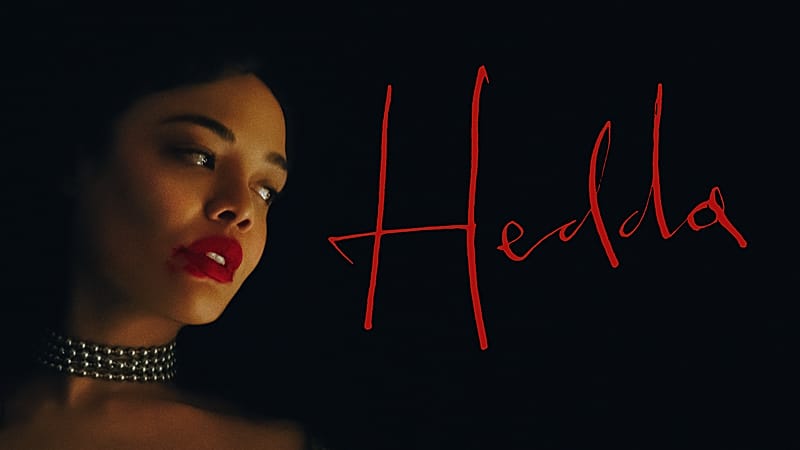
In her dining room, a woman is sitting in front of a large Cubist portrait of herself. She insists on being called by her first name only. Hedda is being questioned by two investigators. There has been a shooting the night before, and they want her to go over the events that led to the incident.
What follows is the detailed account of Hedda Gabler/Tesman’s night spent plotting the downfall of her rivals at any cost.
Hedda is the fourth feature film by filmmaker Nia DaCosta, known for the 2021 Jordan Peele-produced horror film Candyman and, most recently, The Marvels (2023).
The 35-year-old director is back with an adaptation of Norwegian writer Henrik Ibsen’s classic 1891 play “Hedda Gabbler.” The film premiered this year at the Toronto International Film Festival.
It tells the story of Hedda Tesman, née Gabler, (Tessa Thompson), a newlywed hungry for money and status but terribly bored in her marriage to dull academic George Tesman (Tom Bateman)
The Tesmans are back from their honeymoon and preparing to re-enter society by throwing a lavish party in their magnificent but overly expensive new house.
The stakes are high and explicitly laid out. Swimming in debts, George Tesman is unable to afford the luxurious lifestyle his wife expects. He seeks a well-paid university professorship that will be decided by one the guests at the party, Professor Greenwood (Finbar Lynch).
Speaking in their bedroom before the fun begins, George Tesman warns his wife: “Nothing can go wrong tonight, Hedda. Nothing.”
But this was without counting on a special guest, Dr. Eileen Lovborg (Nina Hoss) who does not only seeks the same posting as Tesman but is, as is made clear early on, Hedda’s ex-lover.
Eileen Lovborg claims to have changed since the decadent days of their love affair. She is now sober, with a new life and work partner, Thea (Imogen Poots), to look after her.
She also joins the party with a daring manuscript on the future of sexuality in her bag, which she hopes will seal her grand comeback into the male-centric world of academia.
Throughout the film’s five chapters, Hedda is barely hiding behind the mask of the perfect hostess as she attempts to carry out her devious — but ultimately failing — plan to secure her future.
A bold adaptation
DaCosta delivers a clever and dazzling tale of a quest for freedom and power.
Ibsen’s original story is rendered more modern and exciting thanks to a string of bold adaptation choices that make DaCosta’s feature a compelling standalone work.
Among these is the decision to transpose the story from Ibsen’s Norway to 1950s England. It strengthens Hedda’s frustrated attempts to find freedom in a repressed postwar society.
The significance of this change is also reflected in the film’s set design, crafted by production designer Cara Brower and set decorator Stella Fox.
The action solely takes place on the Tesman estate. The house itself is full of artworks that reflect Hedda’s mid-20th century socialite status, including the Cubist portrait.
The grand staircase is framed with a peacock wallpaper, which is not only a bold decorative choice for a home but also a nod to the animal’s symbolism of power and beauty, two words made for both Hedda Gabler and this film. The set design is further embellished by a clever use of lighting and mirrors.
The film is sometimes heavy on its symbols and foreshadowing. The colour red is everywhere around Hedda as a constant reminder of her dubious morality and of the bloodshed to come.
But it also feels like DaCosta has fun with familiar tropes. Hedda wears around her neck the key to a gun case bequeathed by her father.
We don’t need to wonder when the gun will fire though, as Hedda is seen practising shooting blanks at the very beginning of the story.
The gun reappears towards the end when, after having pushed her to resume drinking and embarrass herself in front of her colleagues, Hedda offers it to Eileen as a suicide weapon.
"Complex Black women on screen"
DaCosta’s cleverest choices involve her characters, and include flipping the gender of Eileen, who is a man named Eilert Lövborg in Ibsen’s play.
Nina Hoss is extraordinarily compelling in her role as a brilliant writer torn between her need for redemption and acceptance, and her professed search for freedom.
DaCosta has said that introducing this lesbian relationship further highlights Hedda’s own quest for social advancement. Hedda has been “a coward at heart” for running away from Eileen and becoming a housewife in a comfortable heterosexual marriage.
But the two women are not speaking from the same perspective. DaCosta’s titular character is a Black woman, and the director masterfully explores the complexity that comes with this identity.
Hedda is a morally dubious and sometimes infuriating anti-heroine who is serving her own interests only. “We as Black people are so afraid of being seen in a negative light because of how high the stakes are for our livelihoods,” DaCosta said in an interview for RogerEbert.com.
“I’m committed to presenting complex Black women on screen, especially Black women behaving badly.”
Tessa Thompson — in her second collaboration with DaCosta after her 2018 debut Little Woods — does wonderful work in presenting this ambiguity.
Hedda evolves in this grand house that she has chosen but doesn’t own, in the company of white people she mostly seems to abhor. At the same time, as the beloved but illegitimate daughter of a venerable general, she also longs to access their status and privileges.
“My intention in giving it this name was to indicate that Hedda as a personality is to be regarded rather as her father's daughter than her husband's wife”, Ibsen wrote in a 1890 letter about naming a play after the protagonist’s maiden rather than married name.
With her adaptation, DaCosta liberates Hedda from all allegiances except to herself and sets the grandeur of her given name in stone.
“Before you were domesticated, you were fire,” one character tells Hedda at the party. DaCosta's modern retelling proves that she still is.
Hedda is out in selected theatres and is streaming on Prime Video now.
Today


